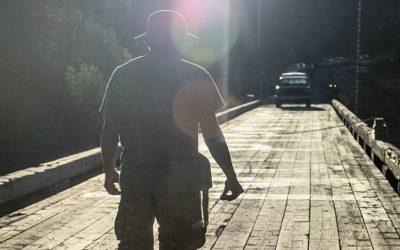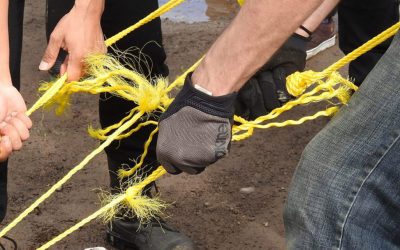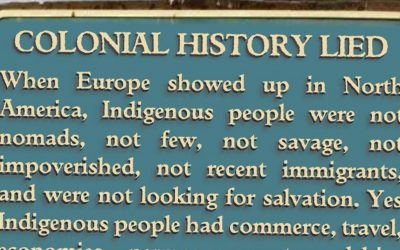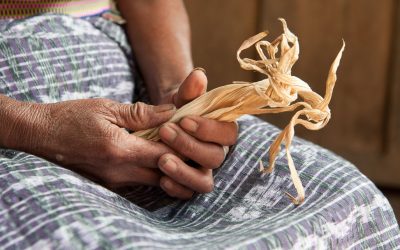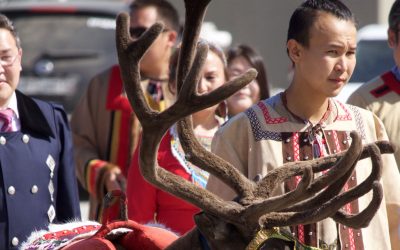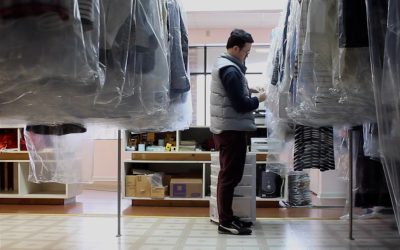BEST OF CULTURALLY MODIFIED
We’re celebrating our Indigenous content in our first ever Best Of issue, and we’re thrilled to feature a brand new exchange with Hereditary Chief Na’Moks and Chief Knedebeas.
Photo by Carla Lewis Photography
STORIES IN THIS ISSUE
The Wet’suwet’en and the Space Between (EXCLUSIVE)
Exclusive Exchange:
Hereditary chiefs on RCMP, industry, and government…
Policing Indigenous Dissent: Trends Behind Wet’suwet’en Raid
This article was originally published in January 2019. It remains just as relevant today…
Hooqwa: My Favourite Wet’suwet’en Word
With beautifully reflective writing, Christine Bruce describes her experience participating in a Wet’suwet’en ceremony…
Decolonizing B.C.’s Roadside History
Joanne Hammond’s popular article challenges the narratives of B.C.’s roadside signs…
Women Who Dig: A Pastoral Meditation on Time
Trina Moyles gives us a fascinating global tour of communities with women farmers…
Meaning in Movement for Eveny Reindeer Herders
In this fascinating account, Sean O’Rourke shares his experience living among the Eveny peoples in Siberia…
How Different Cultures Understand Time
Our Marketing and Communications Manager, Joanne Campbell, selected this article for her staff pick…
Sangsun Choi’s The History of Intimacy (VIDEO)
Our publisher, Rick Budhwa, selected this video as his staff pick in the Best of Culturally Modified Issue…
Cleaning the Beaches in Iceland’s Remote Westfjords
Our Editor, Délani Valin selected this article as her staff pick for the Best of Culturally Modified Issue…
Making the Familiar Unfamiliar
There’s a concept known as the curse of knowledge — a bias that can happen when we know a lot about a subject. The curse of knowledge has a habit of creeping in when we least expect it. It’s a bit like going on autopilot: the sun rises, we follow our morning routine, perhaps we order coffee and the barista says good morning, just as expected. We can pigeonhole people into roles this way. We follow the well-worn grooves of the habitual.
This is the case on Wet’suwet’en territory right now. There’s a complex dynamic between Indigenous peoples, the RCMP, Coastal GasLink, the media, the provincial and federal governments, and others involved. Chief Na’Moks and Chief Knedebeas share their viewpoints in our exclusive article.
For over a year, the people and the events surrounding the Unist’ot’en camp have garnered global attention. Yet, much of what’s emerging casts people in old roles starring in an even older plot. We know these narratives. Or we think we know them. We’ve seen them unfold in Canada since the dawn of colonization, and through the Battle of Batoche in Saskatchewan, during the Oka crisis in Québec, and in every time period in between. We see these narratives globally, whether it involves Indigenous peoples in Australia, Brazil, Sierra Leone, or the United States. Like a well-trodden footpath, we can travel up and down our own expectations for how people will behave, and what outcomes we await.
Since our inception in 2017, we’ve published 63 stunning articles on seven expansive themes. In this issue of Culturally Modified, we’re also taking the opportunity to highlight our Indigenous content, which is anchored in our relationship-driven approach to journalism.
There is danger in engaging with this bias — our curse of knowledge. There is a danger in overlooking the complexity and uniqueness of every new situation, and there is also a risk of neglecting to see people as whole, multi-faceted, and nuanced.
What’s the solution? We can dispel the curse of knowledge by becoming curious. We can come together in our shared spaces: whether in offices, coffee shops, parks, community centres, and, most powerfully, on the land itself. We can listen to those on the ground — those who belong to the communities in question. This requires close collaboration with community members, creating space for Indigenous people to tell their stories, rather than trying to print the quickest headline. At Culturally Modified, the events unfolding at the Unist’ot’en camp are personal — affecting our neighbours, our colleagues, and our friends — and we’re aware of how easy it is for people to become misrepresented. Now more than ever is the time for collaborative, trust-based journalism.
Since our inception in 2017, we’ve published 63 stunning articles on seven expansive themes. In this issue of Culturally Modified, we’re also taking the opportunity to highlight our Indigenous content, which is anchored in our relationship-driven approach to journalism. By working closely with Indigenous communities, we offer a platform to a variety of voices unlike any heard in mainstream media today. We’re also highlighting three of our favourite stories with our Staff Picks, which celebrate the breadth, depth, and diversity of our content. In our first Best of Culturally Modified issue, we’re taking the time to look at these impactful stories with fresh eyes.
Join us, as we make the familiar unfamiliar and highlight articles that teach us something new with every read and re-read.
